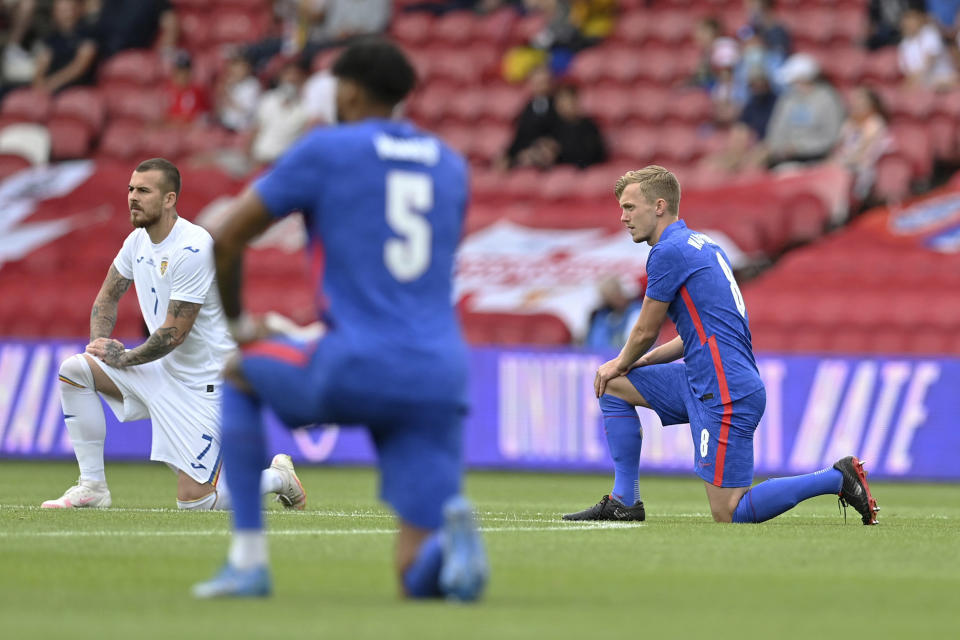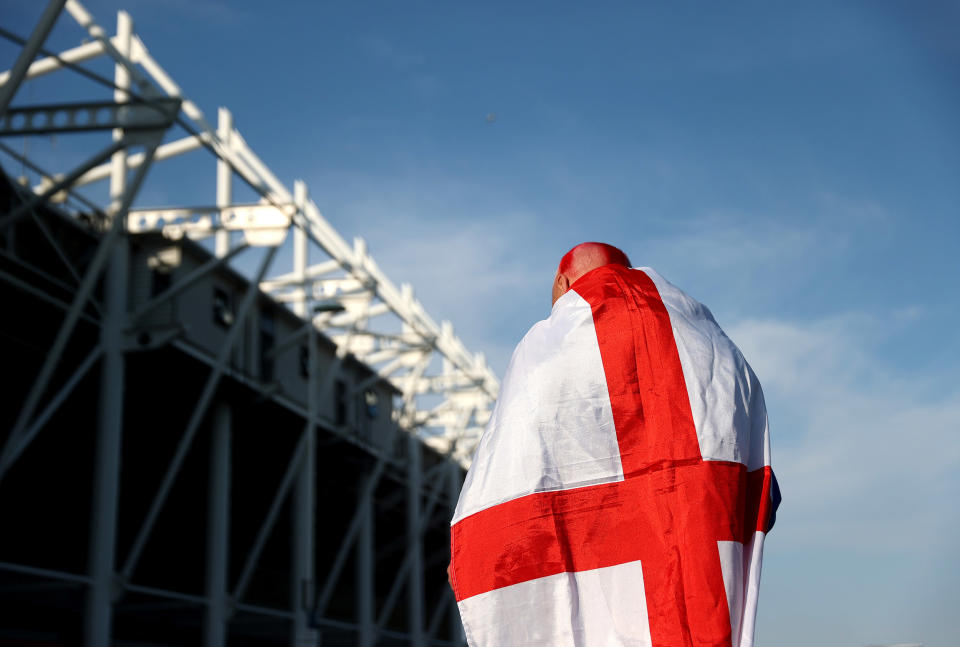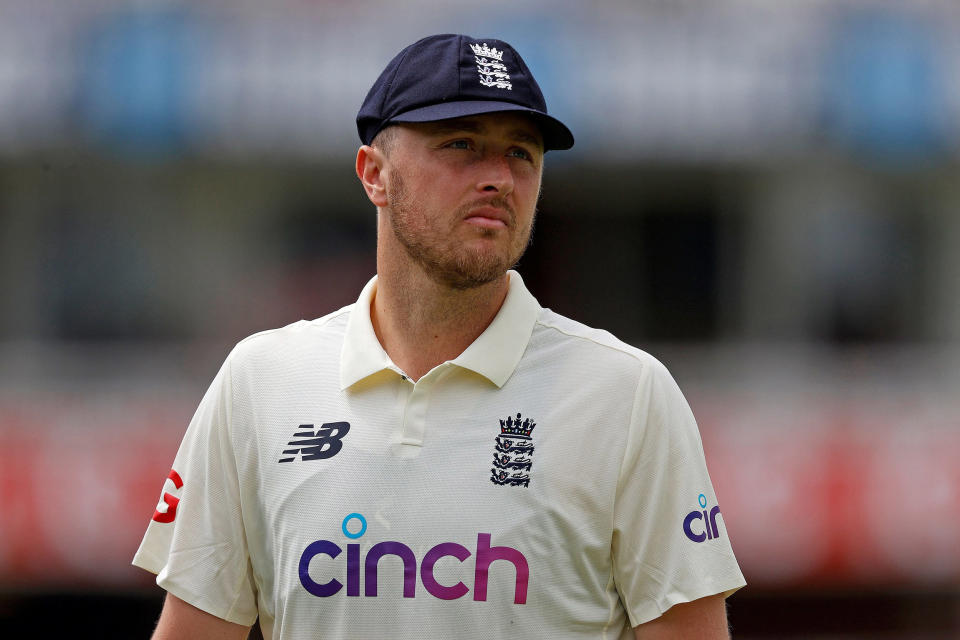England stars take a knee and face surprise fan send off before soccer championships: Boos
- Oops!Something went wrong.Please try again later.
- Oops!Something went wrong.Please try again later.
LONDON — Frenzied media coverage, patriotic fervor and ... booing fans?
The English men's soccer team normally dominates the country's psyche in the days leading up to major tournaments, like this week's European Championships, which began Friday.
But a decision by England's players to take a knee before games to call attention to racial injustice is drawing boos from fans, who recently returned to stadiums after a year marked by pandemic and protest.
The ensuing squabble has been fueled in part by the reaction of Prime Minister Boris Johnson, who, while launching a charm offensive for a post-Brexit "global Britain," has stoked a burgeoning national culture war with distinctly American echoes.

Johnson "would like to see everyone getting behind the team to cheer them on, not boo," a spokesperson said Friday, hours before the tournament kicked off with Italy playing Turkey in Rome.
That followed a week in which the prime minister did not explicitly condemn the booing. His spokesperson told NBC News that when it comes to taking a knee, he "believes in taking action rather than just making gestures."
Johnson's political opponents on Friday criticized the prime minister for what they called a failure of leadership in being slow to explicitly condemn the boos towards the kneeling national soccer team.
Johnson's stance and the mixed messages from his government officials were also criticized as cynical, "Trumpian" and the latest example of his bid to exploit a wider cultural debate over identity — dubbed the "woke wars" by British tabloids.
One Conservative politician, Brendan Clarke-Smith, said in a Facebook post that he would be switching off his television when players kneel, adding that the Black Lives Matter movement had "sinister motives," like "crushing capitalism, defunding the police, destroying the nuclear family."
Download the NBC News app for breaking news and politics
"There's a sporting issue as well as a culture issue," Andy Westwood, professor of government practice at the University of Manchester, told NBC News.
"The reason they're diving in is because it plays well to what they perceive to be their base," he said of supporters of the ruling Conservative Party and those who voted to leave the European Union.
He added that Johnson's government was merely capitalizing on a nationalist sentiment that had been building for years.
Championing an "anti-woke agenda" in sports, museums and on university campuses allows leaders to attack those on the "liberal left," said Westwood, but also deflect other pressures, such as the pandemic and economic fragility.
"It's the politics of division and polarization," he added. "There are kind of echoes of the Trump playbook."

The reputation of English soccer fans often precedes them — boisterous, vocal and at times responsible for hooliganism abroad.
But the official governing body of English soccer, the Football Association, as well as the Free Lions, a group of fans in England and Wales, have both spoken out against the booing, saying it is coming from a "minority of the England crowd."
England coach Gareth Southgate also wrote an open letter on Tuesday urging the country to reflect on the issue.
"I have never believed that we should just stick to football," Southgate wrote. "Everyone has a different idea of what it actually means to be English."
Author and soccer writer Henry Winter applauded Southgate's missive as patriotic and progressive, but said racism in the sport was not new and had been a blight on the game for decades.
But that is changing, Winter added.
"This is a fairly empowered generation of players ... They've got quite a conscience," he said. "They've just decided enough is enough."
According to a YouGov poll published Thursday, the majority of soccer fans in Europe support taking a knee, with backing highest in Portugal, Italy and Spain. It found just over half of soccer fans in England (54 percent) supported the gesture.
Leon Mann, co-founder of the Football Black List, a U.K.-based network that champions diversity in the game, said it was "hugely disappointing" to see fans booing their own players for kneeling.
Fans in Budapest this week also booed Ireland's national team for a taking a knee before a game in Hungary, and Scottish players have said they will also take a knee in a one-off show of solidarity before their European Championship game against England,in London.
Mann said he was worried that serious conversations about racism were being "hijacked" and subject to "dangerous manipulation," by those who benefit from social divisions. He called on the government to explicitly amplify the anti-racism message players were promoting by kneeling.
"For me, the interventions from the government have been massively unhelpful to say the least," he added.

English cricket, a traditionally genteel sport that includes breaks for tea and cucumber sandwiches, also became an arena for a wider debate over identity and culture this week after the resurfacing of historic tweets by England player Ollie Robinson, in which he mocked the appearance of Asians and denigrated women and Muslims.
"I am embarrassed by the racist and sexist tweets that I posted over eight years ago," Robinson, 27, said in a statement. "I deeply regret my actions, and I am ashamed of making such remarks."
He was suspended from all international cricket pending the outcome of a disciplinary investigation, the English governing body said in a statement, adding that the sport was "better than this."
Oliver Dowden, Britain's minster for culture and sports, criticized the suspension.
He said on Twitter that although he didn't condone Robinson's posts, they were "a decade old and written by a teenager. The teenager is now a man and has rightly apologized," Dowden said. He added that the governing body had "gone over the top by suspending him and should think again."
Dowden's political intervention was heralded by right-wing Brexit campaigner Nigel Farage and also backed by Johnson.
But for Mann, sports stars' using their platform to protest injustice still commands a larger audience than the politicians criticizing them.
"Sport can lead the way," he said.

